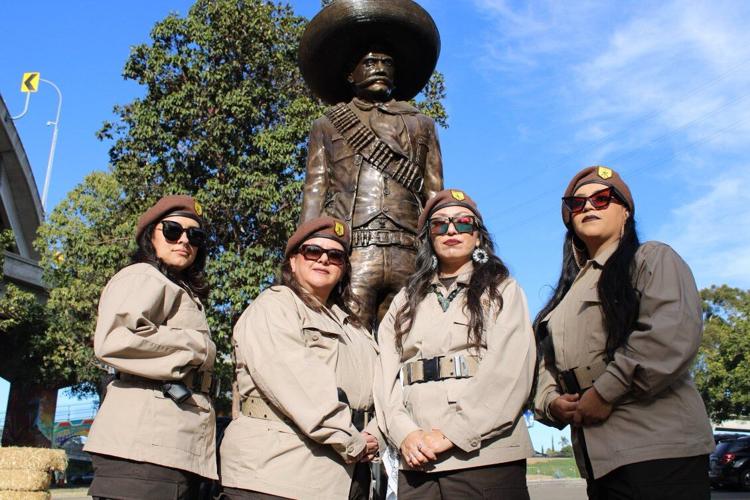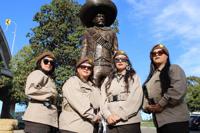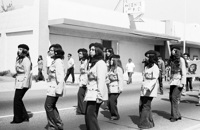
Brown Berets at Mariachi Plaza in Boyle Heights, CA, after they supported East L.A. students with their walkouts earlier this year (photo courtesy of Xochitl Gonzalez)
Not long after Donald Trump’s January 2025 inauguration, Xochitl Gonzalez and Estie, who asked that her last name not be shared, received a call asking them to be security guards for a then-upcoming event where the Riverside community planned to gather and strategize against the president's plans for mass deportations.
According to the Brown Berets website, Xochitl Gonzalez is a comandante of the Brown Berets.
The Brown Berets are a historic Chicano revolutionary organization that aims to serve and protect the community founded in East L.A. in 1967.
For the three-hour duration of the event, Gonzalez and Estie stood watch outside the venue that was filled with about 150 community members, guarding them against possible threats and retaliation from right wing extremists. They observed the crowd for anything suspicious, then watched the parking lot that was overflowing with cars to make sure nobody was tampering with them. The two weren’t paid— it was volunteer work to make the community feel safe and empowered. When the event came to a close, their work was recognized by the many people who came up and thanked them.
“These conferences where we have with Raza, Chicanos … there's going to be disruption by people who are against them and want to come in and interrupt or take over and co-opt or whatnot,” Gonzalez said. “And so we're asked to be there to help them.”
For the last several years, Gonzalez and Estie said they have dedicated their lives to the Brown Berets in acts of protecting and uplifting the Latino community of Southern California.
In addition to works of security, the Brown Berets frequently perform community service work such as feeding unhoused communities, distributing hygiene products, hosting the Chicano Moratorium summer event, amplifying the voices of police brutality victims and fundraising to sustain the organization and for community needs.
The Brown Berets have been fighting for Chicano rights and equity since it was founded in 1967 in response to racism and discrimination against Chicanos in the Los Angeles school system where students were punished for speaking Spanish and discouraged from pursuing higher education. At the same time they were being treated poorly and unfairly; students were seeing their peers being drafted and sent off to the Vietnam War at a young age, which Gonzalez said led to the radicalization of the students and the Berets becoming involved in the East L.A. Walkouts of high schools in 1968.
“Eventually, these kids caught on and said, ‘Hey, no, we're more than that, and this is very unfair,’” Gonzalez said. “They started voicing their rights and they realized this is not okay, and we're going to speak up. And that's how the Brown Berets came into place.”
While the Brown Berets are a historic organization, Gonzalez said that not many people know they still exist and are surprised when they find out. Though the national organization disbanded in 1972 following the Catalina Island takeover demanding that the land be turned into housing, Berets continued their work through chapters in Los Angeles, Texas, Nebraska and Wisconsin. Gonzalez and Estie said they run the San Bernardino, California, chapter of the Brown Berets, one of the largest and most active chapters in the country.

Brown Beret women march in step, 1970 (photo by Wikimedia Commons)
Gonzalez was a full time caregiver with six kids and grandchildren when becoming a Beret seven years ago. At the same time, she remembers scrolling through social media and seeing a lot of injustices happening around her and wanting to make a difference. She wanted to get more involved with Chicano activism.
Gonzalez began attending local community events to get more in touch with the movement, culture and history, and ended up meeting some Brown Berets. She was involved in a chapter in Texas before founding the chapter in San Bernardino.
“I just felt so helpless, I wanted to do more, and so I started looking into the history of the Chicano Movement,” Gonzalez said. “I came across the Brown Berets."
Estie learned about the Brown Berets while attending high school. Coming from an undocumented household, she said she has always been very politically conscious, and that inspired her to advocate for Chicano and migrant rights. She always wanted to take a stand, even more so when Trump first came into office in 2016. One day she saw a picture of Gonzalez standing outside Adelanto Detention Center in her Brown Berets uniform with her three year old child for a “Free Our Kids” march. Estie said that seeing a powerful woman in charge taking action made her want to learn more about the organization and become involved.
“I honestly was so inspired, because I had a daughter around three at the time as well,” Estie said. “I was like, I could do this. That pretty much inspired me to join the Berets, seeing another woman taking charge, and having her little one by her side, and I saw myself in her.”
Estie said she was sworn in as a Beret after one year of doing the work and attending events in the community.
Gonzalez and Estie said they uplift a message of matriarchal militancy through their work. They state their chapter of Brown Berets is Chicana-led. Gonzalez said that once women saw her and Estie leading, it inspired others as well and more began joining. She also said that they are inspired by the matriarchal leadership of women in the Mexica indigenous tribes. “The Mexica had women leading, they had women warriors, and so that's something that we love to incorporate in this organization,” she said.

Brown Berets Comandante Xochitl Gonzalez (left) and Capitana Estie at Chicano Park Day in San Diego, CA in 2023 (photo courtesy of Xochitl Gonzalez)
“Being that we are matriarchal and militant, I feel like it's inspiring to women,” Estie said. “It helps other women look up to us for guidance. I can't tell you how many people I talk to, and we just talk about issues that they're having, and it really helps trying to help guide people.”
Estie said that some people might think of the Brown Berets as a radical organization, but she doesn’t like to use that word because it has a negative connotation, declaring, “Asking for human rights is not radical.” She said that their work is often recognized by the community, with kids coming up to her to shake her hand, telling her “I'm so happy to meet you” and “You're my hero.” Some share artwork they made of her or ask for her autograph.
“It literally has brought me to tears,” Estie said. “It felt so surreal to be somebody recognized and acknowledged, because I've been through so much my whole life, where I felt ignored, I felt silenced, and I feel like I really found my voice here.”
The Berets plan to host a Chicano Moratorium event in East L.A. this August to provide support, entertainment and free food to their community. Gonzalez said it will take thousands of dollars to put on, and the Berets have been conducting fundraisers and taking donations to fund it.
“We are part of the community, and we're trying to put this back together for everybody to make it as big as possible,” Gonzalez said.
“I see our people in dire need, I see the urgency, right now,” Estie said. “I see the corruption happening in front of our faces. I see it, I live it, and I feel like all I want to do is make a positive impact along with my brothers and sisters, because I know we can.”














(0) comments
Welcome to the discussion.
Log In
Keep it Clean. Please avoid obscene, vulgar, lewd, racist or sexually-oriented language.
PLEASE TURN OFF YOUR CAPS LOCK.
Don't Threaten. Threats of harming another person will not be tolerated.
Be Truthful. Don't knowingly lie about anyone or anything.
Be Nice. No racism, sexism or any sort of -ism that is degrading to another person.
Be Proactive. Use the 'Report' link on each comment to let us know of abusive posts.
Share with Us. We'd love to hear eyewitness accounts, the history behind an article.